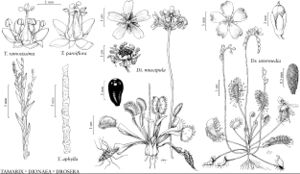Tamarix parviflora
in A. P. de Candolle and A. L. P. P. de Candolle, Prodr. 3: 97. 1828.
Common names: Small-flower tamarisk
Selected by author to be illustratedIntroducedWeedy
Revision as of 21:53, 26 July 2019 by FNA>Volume Importer
Shrubs or trees, to 5 m. Leaves: blade lanceolate, 2–2.5 mm. Inflorescences 1.5–4 cm × 3–5 mm; bract exceeding pedicel, not reaching calyx tip. Flowers 4-merous; sepals 1–1.5 mm, margins entire or denticulate; petals oblong to ovate, 2 mm; antisepalous stamens 4, filaments confluent with nectar disc lobes, all originating from edge of disc. 2n = 24.
Phenology: Flowering early spring–early summer.
Habitat: Riverways, lakeshores
Elevation: 0–1500 m
Distribution

Ariz., Calif., Colo., Kans., Miss., Nev., N.Mex., N.C., Okla., Oreg., Tex., Utah, Wash., s Europe, n Africa, introduced also in Mexico (Baja California), South America (Argentina), Australia.
Discussion
The name Tamarix tetrandra Pallas has been misapplied to T. parviflora.
Selected References
None.
Lower Taxa
None.
